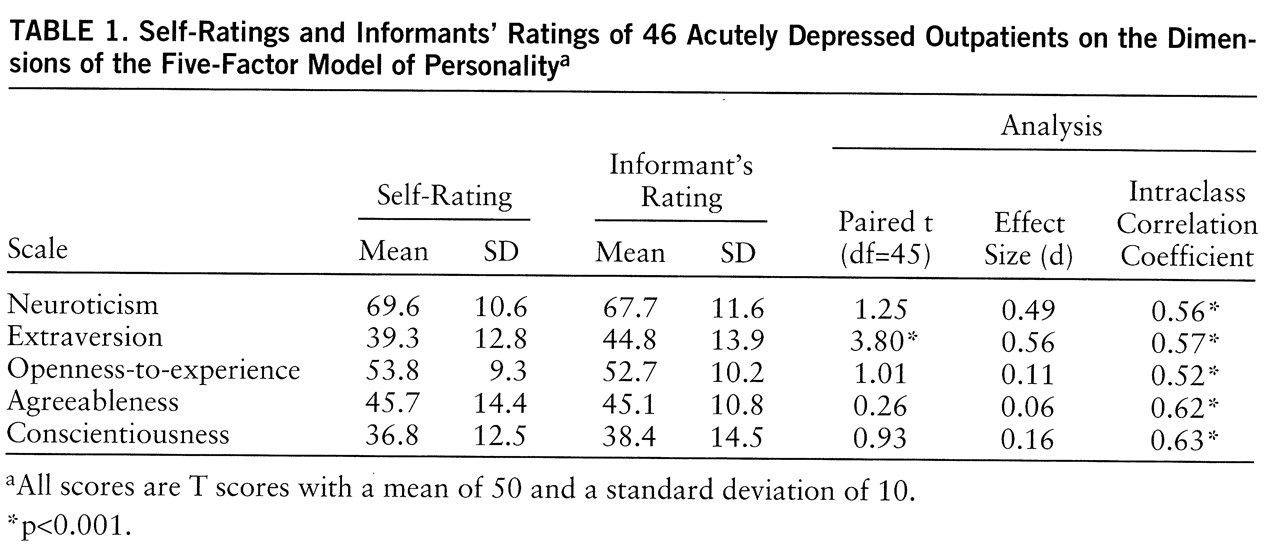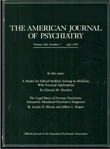It is commonly believed that depressed mood influences the accurate measurement of personality traits, compromising the capacity to establish causal links between personality and depression (
1). Although there is some evidence to suggest that depressed mood may not be as confounding as originally believed (
2), investigators have nonetheless attempted to reduce the influence of depressed mood on the measurement of personality by using a variety of methods, including the assessment of depressed patients upon recovery and the use of clinician ratings. The aim of this study was to obtain personality ratings of depressed outpatients by self-report and by observers (i.e., informants who knew the patients very well). Knowledgeable informants have a broad range of observations across extended periods of time and in a variety of contexts. An informant's ratings, therefore, are probably less influenced by the episodic mood of the depressed patient than other methods of assessment, especially when the informant is instructed to rate the depressed patient as he or she usually is.
METHOD
The study group consisted of 46 depressed outpatients (15 men and 31 women) referred to the Depression Clinic at the Clarke Institute of Psychiatry, Toronto. The mean age of the group was 41.1 years (SD=11.4), and the mean number of years of education was 14.5 (SD=3.8). The average number of previous episodes was 1.1 (SD=1.2).
The informants were either spouses or close friends nominated by the patients. The informants (24 spouses and 22 friends; 20 men and 26 women) had known the patients at least 1 year and interacted with them in a variety of contexts. The mean age of the informants was 41.8 years (SD=12.2). The informants had known the patients for an average of 14.8 years (SD=11.4); 91% (N=42) of them saw the person at least once a week.
The Revised NEO Personality Inventory (
3), designed to measure the five-factor model of personality, was used to assess personality. It is composed of scales corresponding to these basic dimensions of personality: neuroticism, extraversion, openness-to-experience, agreeableness, and conscientiousness. Both the self-report version (form S) and the informant version (form R) consist of 240 items. Form R is identical to form S except that on form R the items are written in the third person. Both of these forms have excellent test-retest reliability, and extreme scores represent a broad range of personality psychopathology (
4).
After all patients had given written informed consent for participation, they were administered the Structured Clinical Interview for DSM-IV Axis I Disorders, Patient Edition (
5), and the 17-item Hamilton Depression Rating Scale (
6). Patients who 1) met the DSM-IV criteria for primary unipolar, nonpsychotic major depression, 2) did not have a concurrent active medical illness, 3) had been medication free for a minimum of 2 weeks before treatment, and 4) had a Hamilton depression scale score of at least 15 were included in the study. The mean Hamilton depression score of the group was 21.9 (SD=3.8).
The patients completed the Revised NEO Personality Inventory at the beginning of treatment. The informants were instructed to rate the patients as they usually are and not as they are when depressed. The informants also completed a poststudy questionnaire that included questions to gauge the informant's beliefs about the impact of depression on the patient's personality. All forms were returned during the patients' next visit to the clinic, 2 weeks after their initial visit.
Intraclass correlations (
7) were used to assess the agreement between the self-ratings and informants' personality ratings. Paired t tests and effect sizes (Cohen's d) (
8) were used to calculate differences between these same ratings. An effect size of 1.00 or greater was considered clinically meaningful.
RESULTS
Table 1 displays the results of the study. The self-ratings and informants' ratings for all five personality dimensions were significantly correlated; the only statistically significant difference in the magnitude of the scores was for extraversion. The effect size for this difference was not considered clinically significant.
To assess the potential impact of depressed mood on personality, the informants were asked to judge this impact for each of the five dimensions. Most informants reported that compared with his or her usual self, when depressed the patient appeared to be more neurotic (higher neuroticism rating; 96%, N=44), introverted (lower extraversion rating; 87%, N=40), down-to-earth and practical (lower openness-to-experience rating; 63%, N=29), more disagreeable (lower agreeableness rating; 70%, N=32), and less well-organized and more careless (lower conscientiousness rating; 54%, N=25).
DISCUSSION
The correlations between the self-ratings and informants' ratings were high and exceed those reported between self-report and informants' ratings in a nonpatient (normal) sample (
4). The magnitudes of the scores for the self-report and informants' ratings were also similar; the exception was for extraversion, and this difference did not produce a clinically meaningful effect size. These results suggest that depressed mood does not alter significantly the self-rating of personality traits, at least within the domain of the five-factor model as assessed by the Revised NEO Personality Inventory. This result also supports a number of recent investigations indicating that neither past nor current depression has a significant impact on the self-report of personality (
9,
10).
A possible limitation of this study is that although the informants were directed to rate the patients as they usually are when not depressed, the patients' depression might still have colored the informants' ratings of them. On the basis of the finding that a majority of the informants rated the depressed person to be more neurotic and introverted when depressed, we believe that the informants were able to recognize these differences. There is no reason to believe, therefore, that informants cannot rate patients as they usually are when so instructed.
Another limitation is that we were unable to collect informants' and self-report ratings after the patients had recovered from the current depressive episode. However, in the only other study which we are aware of that compared self-ratings and informants' ratings of depressed patients' personality traits, Peselow et al. (
11) found that informants generally rated the patients as having higher levels of psychopathology, regardless of the patients' depressive status. Moreover, the informants' ratings of the patients with depression in our study are very similar to the self-ratings of patients who had recovered from depression that were reported in an earlier study (
12). These findings, coupled with the results of recent studies, indicating that personality traits are not altered by an episode of major depression (
10,
11), suggest that informants' ratings are not contaminated by the state of depressed mood.


